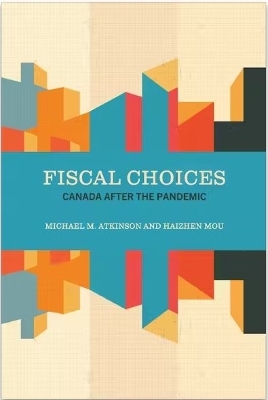
Fiscal Choices
University of Toronto Press (Verlag)
978-1-4875-4718-9 (ISBN)
The COVID-19 pandemic revealed that governments can quickly respond to a fiscal crisis without becoming mired in unproductive wrangling. But the pandemic has also revealed the limits of traditional policy instruments in stabilizing the economy, controlling inflation, and fostering economic growth. Fiscal Choices sheds light on the economic dimensions of COVID-19 and examines the state of Canada’s fiscal policy and fiscal health following the pandemic.
The book covers a cluster of key fiscal policy topics: the overall capacity of government, the growth of inequalities, the management of sovereign debt, and the troubled institutions of federalism and parliamentary government. The book draws upon candid, in-depth interviews with over 70 former and current politicians, public servants, and academic experts who aim to establish a sustainable future within an accountable political system.
The book argues that although those who are entrusted with the instruments of power are intelligent and well meaning, they are reluctant to take risks or abandon well-known, if poorly performing, formulas. It concludes with a set of predictions and prescriptions rooted in a realistic interpretation of Canada’s political economy. Ultimately, Fiscal Choices presents a sober assessment of federalism and parliamentary government as instruments of democratic accountability.
Michael M. Atkinson is an emeritus professor at the Johnson-Shoyama Graduate School of Public Policy at the University of Saskatchewan and an adjunct professor in the School of Public Administration at the University of Victoria. Haizhen Mou is a professor at the Johnson-Shoyama Graduate School of Public Policy at the University of Saskatchewan.
List of Illustrations
List of Tables
Preface
Abbreviations
1. The Pandemic and After
Responding to the Pandemic
The Post-pandemic Search for Stability
What Kind of Change Is Required?
Keep in Mind
2. Making Economic Decisions
An Epistemic Elite
Distinctive Roles and Critical Relationships
The Limitations of Elite Decision-Making
Conclusion
3. Governing after the Pandemic
Can Government Do Good?
Stabilizing the Economy: Program Design and Delivery
Governments’ Role in the Economy: Will Anything Change?
The Growth Imperative
Conclusion
4. Coping with Income and Wealth Inequalities
Why Is Inequality a Problem?
The Complicated Relationship between Inequality and Economic Growth
Traditional Programs That Tackle Inequality
Alternative Proposals on Inequality
Conclusion
5. Dealing with the Debt
Debt Dimensions
The Debt Threat
Guardrails, Anchors, and Rules
Debt Options: Good, Bad, and Ugly
Conclusion
6. Holding the Federation Together
Evaluating Fiscal Federalism Institutions
The Pandemic: Addressing a Fiscal Emergency
Risk Reduction
Risk Sharing
Conclusion
7. Keeping Government Accountable
On Being Accountable
Parliament and the Budget Process
Bureaucrats, Budgets, and Program Reviews
Auditors and Budget Officers
Conclusion
8. Canada’s Fiscal Future
Stubborn Realities
Pandemic Effects
Pressing Needs
Conclusion
Appendix 1: Interview Questions
Appendix 2: A Survey on Canadians’ Opinions on the Post-pandemic Economy and Fiscal Policy
References
Index
| Erscheinungsdatum | 05.01.2024 |
|---|---|
| Reihe/Serie | The Johnson-Shoyama Series on Public Policy |
| Zusatzinfo | 18 b&w figures, 6 b&w tables |
| Verlagsort | Toronto |
| Sprache | englisch |
| Maße | 152 x 229 mm |
| Gewicht | 400 g |
| Themenwelt | Medizin / Pharmazie ► Gesundheitswesen |
| Sozialwissenschaften ► Politik / Verwaltung ► Staat / Verwaltung | |
| Wirtschaft ► Volkswirtschaftslehre ► Makroökonomie | |
| ISBN-10 | 1-4875-4718-8 / 1487547188 |
| ISBN-13 | 978-1-4875-4718-9 / 9781487547189 |
| Zustand | Neuware |
| Informationen gemäß Produktsicherheitsverordnung (GPSR) | |
| Haben Sie eine Frage zum Produkt? |
aus dem Bereich


